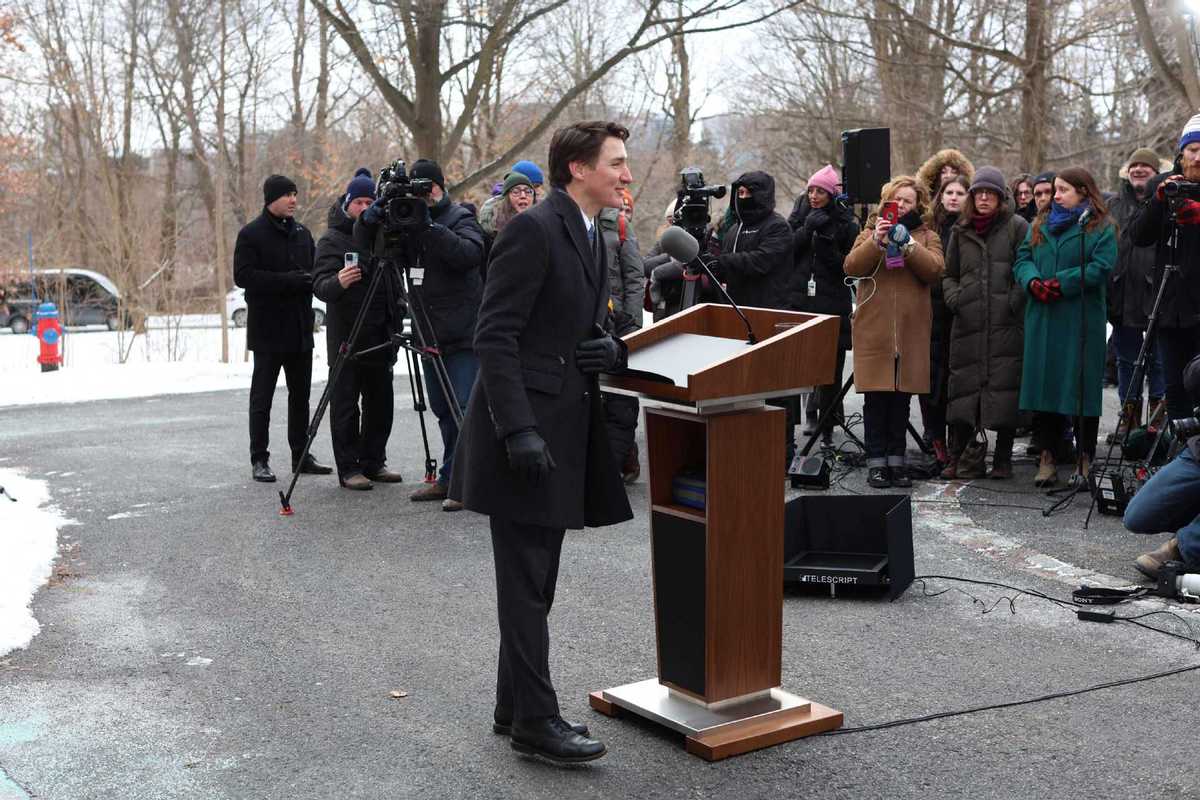Trudeau to step down as Canada's PM
Resignation comes amid challenges as Liberal Party looks to elect new leader
By YANG RAN | China Daily | Updated: 2025-01-08 09:36

Canadian Prime Minister Justin Trudeau announced his resignation on Monday morning after nine years in power, amid Canada's internal challenges and external pressures.
While giving a speech outside his home at Rideau Cottage, he said he would leave the office as soon as his party chooses a new leader.
"I intend to resign as party leader and as prime minister after the party selects its next leader through a robust, nationwide competitive process," Trudeau said. "This country deserves a real choice in the next election, and it has become clear to me that if I am having to fight internal battles, I cannot be the best option in that election."
The prime minister also said Governor General Mary Simon had granted his request to prorogue Parliament until March 24. This prorogation buys the Liberals time to run an expedited leadership race.
The Liberal Party will conduct a nationwide competitive process to select a new leader. This process typically spans several months and includes a formal leadership convention. Given the current circumstances, the Liberals will have to select a new leader in time for the return of Parliament at the end of March.
Several candidates are expected to enter the leadership race in the coming days, including former Bank of Canada governor Mark Carney, former finance minister Chrystia Freeland, and former premier of British Columbia Province Christy Clark. Once elected, the new leader will automatically become the prime minister, replacing Trudeau until the next general election.
The general election must be held by Oct 20, and polls show voters angry over high prices and a shortage of affordable housing will elect the opposition Conservatives and hand the Liberals a resounding defeat, no matter who leads the party.
Trudeau, 53, took office in November 2015 with a message of hope and "sunny ways" and won reelection twice, becoming one of Canada's longest-serving prime ministers. However, his popularity has declined in recent years due to issues such as the soaring cost of food and housing, as well as surging immigration.
A November 2024 poll by Leger, a Canadian market research company, showed that 42 percent of Canadians plan to vote Conservative in the next election, compared with 26 percent for the Liberals and 15 percent for the New Democratic Party. Almost seven out of 10 Canadians are dissatisfied with Trudeau's government, according to the same poll.
Sun Xihui, an associate research fellow of the National Institute of International Strategy at the Chinese Academy of Social Sciences, said that Canada's domestic hardships are the main reason for Trudeau's resignation.
"Several internal issues are at play, with the economy being the most fundamental. Canada's economic conditions have been poor both internationally and domestically, affecting incomes and people's well-being, which is a major source of discontent. The deterioration of public safety, which is interconnected with economic issues and immigration issues, has also significantly fueled dissatisfaction with the government," said Sun.
Pressure from ally
On the foreign affairs front, the Trudeau government has also faced significant pressure from its closest neighbor and ally, the United States.
US President-elect Trump reacted to Trudeau's announcement by repeating earlier comments that Canada would gain from becoming the 51st US state and complaining about Canada's trade surplus with the US.
"The United States can no longer suffer the massive Trade Deficits and Subsidies that Canada needs to stay afloat. Justin Trudeau knew this, and resigned," he said on Truth Social.
In November, Trump also announced plans to impose a 25 percent tariff on all Canadian products, if the government does not stem what Trump calls a flow of migrants and drugs in the US. Since about 75 percent of Canada's exports go to the US, this move could sharply increase export costs and potentially slow down Canada's economic growth, even risking a recession.
Following Trump's tariffs threat, the Trudeau government has seen several personnel changes, fueling growing calls for Trudeau to step down both inside and outside the party.
"The US, the ally Canada has long followed, is now emerging as its biggest external threat. This threat is multifaceted, involving tariff pressures, existential threat from Trump's calls for absorbing the nation as the US' 51st state, and challenges related to North American security cooperation," said Sun.
"Regardless of whether the Conservative or Liberal Party is in power, the future Canadian government will struggle to address long-standing issues like economic downturns, worsening public safety, and immigration challenges. These problems are unlikely to be resolved quickly and may even intensify. Both external pressures and the deterioration of domestic issues will present significant challenges for Canada," he added.
Agencies contributed to this story.
yangran1@chinadaily.com.cn
























